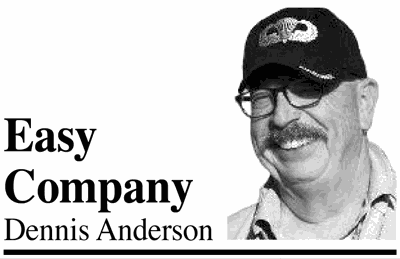
A fall morning in the Antelope Valley ushers in as blue a sky as you will find West of the Rockies and the air is crisp as the first bite of an apple.
You see the deputies, a trio of them marching in a single file rank and the creases in their khaki-and-green uniforms are as sharp as a paper cut.
They approach three deputies, standing at the military position of parade rest. Those three straighten up to the position of attention and the two ranks face each other and salute.
All of them pass in review of a large, decorative yellow, floral Sheriff’s badge crossed with a black stripe, propped on an easel, next to an
American flag.
The flag was secured to the chainlink fence on the boundary of the townhome development where Los Angeles County Sheriff’s Sgt. Steve Owen was shot and killed, execution-style on Oct. 5, 2016.
“It is hard to believe it’s been three years,” said retired Deputy Randy Harris, a man who rolled with Sgt. Owens in life and honors him in memory.
This past Saturday, was three years since the killing of Owen.
Nobody saw that as the end for Owen, who lived in the ranks of the loved and respected among experienced Sheriff’s deputies. He was 53, and therefore, pretty close to an honorable retirement. He coached at Paraclete High School. He was a practiced equestrian who taught former Sheriff Jim McDonnell how to ride.
By the counts in the charges, the parolee who killed him was a felon in possession of a firearm. Whatever the outcome, he most likely will live long years in prison. Trenton Trevon Lovell, held without bail since the killing, is about 30 years old.
While his legal fate will not be concluded, likely through years of trial with inevitable appeals, his life will likely be one of continued misery and ennui. And we judge not, lest we be judged. But he will be judged, finally.
The way that 1,095 days since Owen’s killing, was marked with
solemn respect.
The vigil began at midnight on Oct. 5, and went on for 24 hours — with ranks of deputies replacing the last rank with the next one, Sheriff’s Department Spokesperson Ali Villalobos explained.
“They are all on their own time,” she said. “Everyone volunteers, so no Sheriff’s Department time is used.”
A black-and-blue law enforcement flag provided the narrative of what happened within the environs of 32nd Street West and Avenue J-8.
On Oct. 5, 2016, Sgt. Steve Owen lost his life here. Many remember him now as a hero, immortalized by the
memory of his death.
His life was so much more. He was a devoted husband, a loving father, a beloved, son, a brother, a partner, an outstanding mentor and a dedicated street cop.
He went to work every single day with the knowledge every cop has, that there was always a chance of not going home.
Still, he overcame that fear and went out on patrol every single day, to face other people’s
nightmares too.
He died a hero, but how he lived is what truly made him heroic. The deputies of Lancaster Station appreciate the love and support
of our community.
Though we protect you, we could not do our job without your support. Thank you for your continuing support as we honor our fallen brother.
So, the vigil continued, the deputies standing post on their own time, from midnight
to midnight.
On the weekend following the killing of Owen, who undertook that most dangerous of tasks voluntarily, thousands of people turned out in Lancaster for a candlelight vigil and walk in memory.
At his passage, that kind of hailing to Valhalla that is the hallmark of first responder memorials, thousands again. His commanders, his partners, the ones who knew him and the ones who never met him.
Our passing acquaintance was at a couple of outdoor events, securing the public peace and in the honors at city hall. Really, I can only say I knew him the passing nod between a law enforcement officer and anyone wearing a veterans ball cap.
Three years on, I know this. Sgt. Steve Owen is remembered, with love and respect. The other guy has already passed into shadow in the darkest of passage, even in life, a kind of permanent midnight.
Dennis Anderson is a licensed clinical social worker at High Desert Medical Group who served as editor at the Antelope Valley Press from 1999-2015. He works on veterans and community mental health issues.
